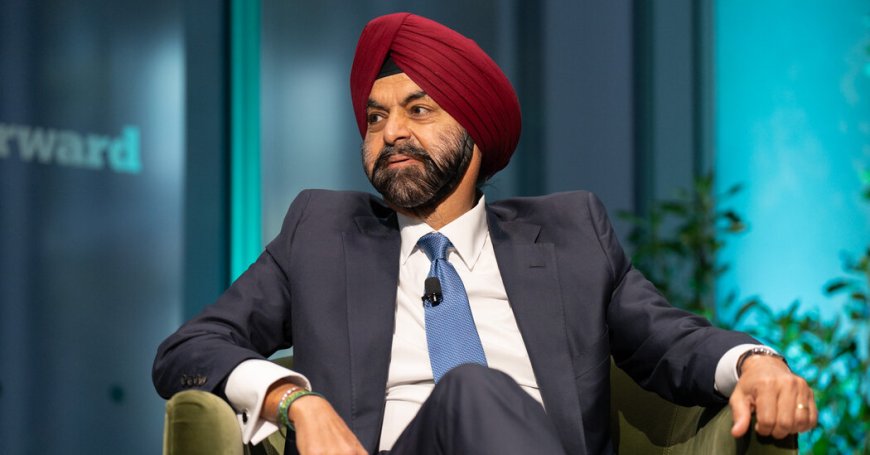Sex Abuse Inquiry Poses Leadership Test for World Bank’s Ajay Banga
Sex Abuse Inquiry Poses Leadership Test for World Bank's Ajay Banga The New York Times

The World Bank Faces Scrutiny Over Abuse at Kenyan Schools
The bank is facing scrutiny as it debates how to compensate victims of abuse at Kenyan schools that it was financing.
At the World Bank’s annual meetings last year in Morocco, the organization’s new president, Ajay Banga, outlined a sweeping vision for how he wanted to rid the world of poverty while keeping the planet habitable.
Four months later, Mr. Banga, who assumed the top job last June, is confronting his first big management test and some early signs of unrest that have little to do with his aspirations to modernize the bank and supercharge its ambitions to combat climate change.
The challenge is related to an investment that the World Bank made a decade ago in a chain of schools in Kenya. The educational project was partially funded through the International Finance Corporation, the bank’s investment arm. It became a source of controversy when allegations emerged in 2020 about widespread sexual abuse at the schools, prompting an investigation by the bank’s internal watchdog.
The executive board of the I.F.C. has been reviewing a revised “action plan” that could take effect as soon as this week.
In recent months the World Bank’s leadership has been engaged in fraught deliberations over how much responsibility to accept and whether to compensate the victims. The debate has divided the countries that are invested in the bank and put a spotlight on Mr. Banga, who will be responsible for finalizing and carrying out the action plan.
The case has drawn the scrutiny of development experts and lawmakers, amid suggestions that the World Bank failed to police how its money was being used and even took steps to cover up wrongdoing.
Introduction

Management Test and Controversy
SDGs, Targets, and Indicators
-
SDGs Addressed or Connected to the Issues Highlighted in the Article
- SDG 4: Quality Education
- SDG 5: Gender Equality
- SDG 16: Peace, Justice, and Strong Institutions
-
Specific Targets Under Those SDGs Based on the Article’s Content
- SDG 4.7: By 2030, ensure that all learners acquire the knowledge and skills needed to promote sustainable development.
- SDG 5.2: Eliminate all forms of violence against all women and girls in the public and private spheres, including trafficking and sexual and other types of exploitation.
- SDG 16.6: Develop effective, accountable, and transparent institutions at all levels.
-
Indicators Mentioned or Implied in the Article to Measure Progress towards the Identified Targets
- Number of learners in the schools who have acquired knowledge and skills related to sustainable development.
- Number of reported cases of violence against women and girls in the schools.
- Transparency and accountability measures implemented by the World Bank and its investment arm.
Table: SDGs, Targets, and Indicators
| SDGs | Targets | Indicators |
|---|---|---|
| SDG 4: Quality Education | Target 4.7: By 2030, ensure that all learners acquire the knowledge and skills needed to promote sustainable development. | Number of learners in the schools who have acquired knowledge and skills related to sustainable development. |
| SDG 5: Gender Equality | Target 5.2: Eliminate all forms of violence against all women and girls in the public and private spheres, including trafficking and sexual and other types of exploitation. | Number of reported cases of violence against women and girls in the schools. |
| SDG 16: Peace, Justice, and Strong Institutions | Target 16.6: Develop effective, accountable, and transparent institutions at all levels. | Transparency and accountability measures implemented by the World Bank and its investment arm. |
The article highlights the issues related to an investment made by the World Bank in a chain of schools in Kenya, which became a source of controversy due to allegations of widespread sexual abuse. These issues are connected to several Sustainable Development Goals (SDGs).
SDG 4: Quality Education is relevant as the educational project funded by the World Bank aimed to provide education in Kenya. The target under this SDG is to ensure that all learners acquire the knowledge and skills needed to promote sustainable development (SDG 4.7). The indicator mentioned in the article is the number of learners in the schools who have acquired knowledge and skills related to sustainable development.
SDG 5: Gender Equality is connected to the issue of sexual abuse at the schools. The target under this SDG is to eliminate all forms of violence against all women and girls, including sexual exploitation (SDG 5.2). The indicator mentioned in the article is the number of reported cases of violence against women and girls in the schools.
SDG 16: Peace, Justice, and Strong Institutions is relevant as it addresses the need for effective, accountable, and transparent institutions. The target under this SDG is to develop such institutions at all levels (SDG 16.6). The indicator mentioned in the article is the transparency and accountability measures implemented by the World Bank and its investment arm.
Behold! This splendid article springs forth from the wellspring of knowledge, shaped by a wondrous proprietary AI technology that delved into a vast ocean of data, illuminating the path towards the Sustainable Development Goals. Remember that all rights are reserved by SDG Investors LLC, empowering us to champion progress together.
Source: nytimes.com

Join us, as fellow seekers of change, on a transformative journey at https://sdgtalks.ai/welcome, where you can become a member and actively contribute to shaping a brighter future.







